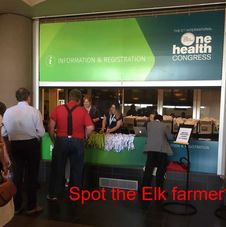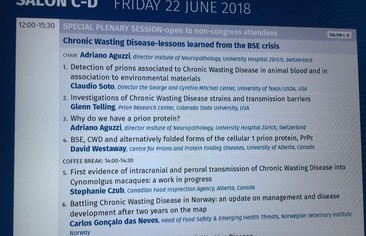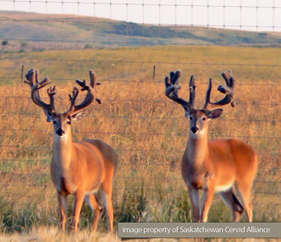|
2022's AGM will once again be virtual. It will be held April 6th @ 8:30 PM via ZOOM. If you wish to attend, please email [email protected]
0 Comments
This past August we conducted our first conference call annual meeting to review the past year, adjust policies and elect new board members. It was well "attended" and a lively discussion for two + hours. We have some new and returning faces on the board this year. Bentley Brown and Shanda Bradford have joined the ranks with Shanda as the new Secretary position and Blaine Weber was elected president with Ali Wehrkamp taking over the Vice president role.
The extremely busy month of June is almost done and the rain has begun to fall across the prairies after an record breaking dry spring. Hay stocks have taken a beating keeping animals fed while waiting for the grass to grow. Heavy pressure on any grass early in the season sets it back for the remainder of the year. Some producers are supplementing with pellets and oats, and supplement blocks can increase animals digestive efficiency (like this sweetpro block formulated for elk and deer). If you don't or wont have enough quality feed and grass now is a good time to cull. AWAPCO in Alberta is planning a July slaughter, contact them now to see if you can make the receiving date. If you have questions about where your animals qualify to be shipped, contact AWAPCO or any of the guys out there shipping animals, they can and will answer your questions. Don't assume your herd is stuck. See the classifieds section for contacts.
The winter was reasonable and animals came through in good shape. One exception was the huge increase in winter ticks/lice/mites seen across the prairies in large farm animals. Vets have reported a lot of farmers coming to them in late winter about scratching cattle and hair loss. https://www.producer.com/2019/03/lice-increase-in-prevalence-across-western-canada/ https://www.producer.com/2019/03/producers-report-more-itchy-cattle-complaints-this-winter/ If this is happening on your farm, it may be time to change up your parasite control. Consult with your vet on different options out there. New products have come on the market the last few years that are making big waves. SCA will have Earl Davis, owner of Mohawk Vet Clinic in Melfort, speaking at our 2020 convention on the many products available for cervids. A well timed summer treatment can also give you the biggest calves you have ever had. Calves and fawns have arrived to warm weather and velvet season is well underway. Many farms are reporting velvet weights lower than normal, likely due to the continuing drought. Prices have not been set for this upcoming season but expect them to be in the same range as last year. If you want to hear straight from the buyers on price, all contact information is located in the Classifieds section. Breeding season will be here before you know it, so now is the time to find your newest additions to your farm so they can be moved and settled before September. You can also see what a breeder bull has to offer in the velvet department. If you are on the HCP (formerly known as the VHCP), check to ensure any farm you are purchasing from has your status or higher. Contact the Canadian Sheep Federation that administers the program to ensure their status is up to date as their lists online are updated quarterly. Email [email protected] . If you do not have TB status on your farm, consider getting it. Yes, it is not a fun process but once you have it, a lot more opportunities for income are at your disposal and you have it for five years. Call some friends and fellow producers for help if you need it and get it done. Plan it out to coincide with other handling/ treatments/ inspections. Choose late fall to mid March to avoid soft antlers and the effects of the rut. Contact your local CFIA office to book a date. The SCA board is busy fielding many requests for input on proposed regulations. We have multiple meetings scheduled for this summer and we are working hard to protect our producers and open new opportunities for our products. Whatever direction you are taking your farm, it always helps to phone people and get the latest news on things. Stay in touch or try calling someone new. Our board of directors are always happy to discuss these issues with you. Call us, as the infamous Red Green would say "I'm pulling for you, we are all in this together." Grant funding has been received to start live testing for CWD in Saskatchewan game farms! This is a very exciting development for our industry, with the potential to change how positive farm cases are handled in future. A presentation at our annual conference in 2019 by Brian Zwaan of Prairie Diagnostics explains the process, follow the link to watch the full video presentation HERE.
RAMALT (Rectoanal Mucosa-Associated Lymphoid Tissue) testing has been used in Texas for many years on over 100,000 deer and is recognized by the Saskatchewan government as an effective live test for CWD in deer. This grant program is to explore the effectiveness of the test on elk. The funds are going towards training veterinarians and testing animals, creating a large sample size that will determine the accuracy of this test. If successful, in the future producers with a positive case on their farm may have to option of live testing to determine what steps they take next. Here is a link to an interview given by our own Harvey Petracek, Sask CCA rep on the appeal of this test for all producers. https://www.highriveronline.com/local/new-testing-method-could-increase-biosecurity-in-elk-herd-populations The Saskatchewan government is offering a rebate program on 50% of eligible expenses up to a maximum of a $15,000 rebate. Producers must take the FREE biosecurity training the SCA is providing at our annual March conference in Saskatoon to be eligible. This training will be provided each year the rebate program is running. This funding is meant to help offset the cost of biosecurity measures like fencing in feed storage areas and shared water to prevent wildlife contact as well as quarantine pens, cleaning stations, and proper disposal of carcasses. Follow this link for more information and sign up today for the free training March 30, 2019 in Saskatoon.
The Assurance System Producer Rebate Scientists from the University of Alberta say they have discovered a property in soil that could potentially help reduce the spread of chronic wasting disease.
While they aren’t exactly sure how the soil property, known as humic acid, is reducing the infection, their research shows it is able to break down the abnormal protein that causes the disease https://www.producer.com/2019/01/humic-acid-in-soil-may-help-reduce-cwd/  Members of the SCA attended the CWD symposium put on by the International One Health Congress on June 22 in Saskatoon. This was a free workshop open to the public with many scientists presenting new findings on this prion disease. Although much of the presentations were very geared towards the other scientists and academics present, it was well worth attending for anyone interested in learning more about this disease. Some interesting highlights included - Glenn Telling ran tests with the cwd discovered in Norway in two separate animals (reindeer and moose) and discovered these were two different strains from the CWD found in North America. - Carlos Goncalo das Neves presented the Norwegian governments plan for handling the CWD present in one reindeer herd. They chose to eradicate the herd and reintroduce animals in 5 years to the remote mountain region they inhabited. -Stephanie Czub presented on her on going Macaque study in Alberta which has been making news for the past year. An SCA member asked when this study would be published and peer reviewed and she says it is forthcoming. A similar study was published in the states with no animals infected and we were able to ask what the difference was between the studies. Among the differences she listed were animal ages, exposure quantities and different strains of the disease used. We strongly encourage our members to attend workshops like this to learn as much as you can about this disease. Our annual AGM held each spring brings in many talented speakers in this area. People often ask what does the SCA do? We are the voice of the farms, ranches and preserves when dealing with government and proposed regulations. After the symposium we met with government officials to review proposed policy changes. Our board members drove from up to five hours away to be present and voice their opinions or concerns for the benefit of this industry. This is all volunteer time and volunteer gas money. As always, we greatly appreciate our government officials working with us for a better future.  If you would like to receive regular updates from Norelkco on velvet prices and collection dates, contact them to be added to their email list. Contact [email protected] Norelkco is a Saskatchewan based co-operative of Elk Producers that purchase velvet to market to the world. You do not need to be a member to sell through Norelkco. They can come directly to your farm and pick up your harvest. If you have questions about how and when to harvest for best prices, contact them today. Prices this year are looking very promising. Starting December 1st, 2018, new rules will stop the sale of antibiotics in store directly to the animal owner. Items you could previously pick up at your local co-op or Ag store will now require a prescription written by your vet. If you don't have a vet now, make sure to establish a relationship with one to save time in the future when you need something.
www.producer.com/2018/05/antibiotic-rules-usher-in-new-vet-drug-era/ |


